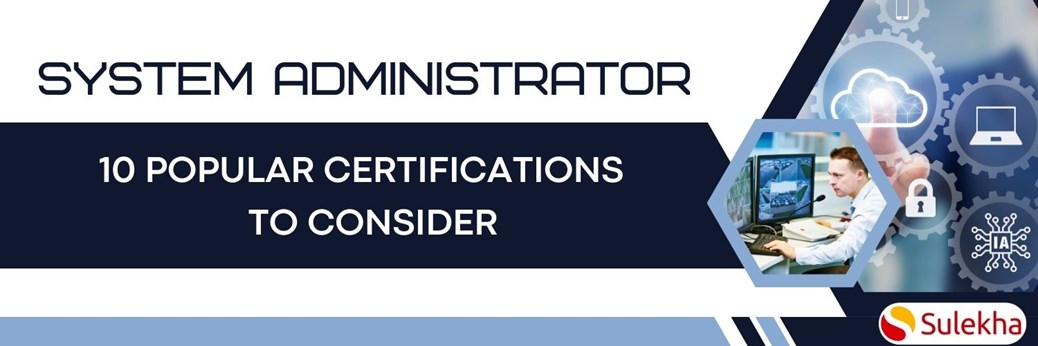10 Popular System Administrator Certifications To Consider

In the ever-evolving tech landscape, the journey of a System Administrator is one of perpetual learning. Due to this, the demand for system administrator certifications proliferates as organizations seek validated expertise in managing complex IT infrastructures, enhancing security, and optimizing system performance. So, pursuing salesforce system administrator certification will help you land your dream job.
In this blog, we shall discuss the best certifications for system administrators and what is sysadmin certifications.
What is a system administrator?
A system administrator, often called a sysadmin, is an IT professional responsible for managing and maintaining the operation of computer systems, networks, and servers within an organization. Their primary duties include installing, configuring, and maintaining hardware and software infrastructure, managing user accounts and access controls, monitoring system performance, troubleshooting technical issues, ensuring data backups, and implementing security measures to protect the organization's IT assets. System administrators are crucial in providing an organization's IT environment's reliability, security, and efficiency.
Roles and responsibilities of sysadmin:
- Perform routine maintenance tasks such as installing and configuring hardware and software, applying updates and patches, and ensuring the smooth operation of computer systems and servers.
- Managing user accounts, permissions, and access controls, including creating and deleting user accounts, assigning privileges, and ensuring compliance with security policies.
- Implement and manage data backup processes to safeguard against data loss and develop and test disaster recovery plans to ensure business continuity in the event of system failures.
- System administrators enforce security policies and conduct security audits to identify and address vulnerabilities.
Why System administration certifications are important:
1. Validation of skills:
Certifications demonstrate that a system administrator has acquired specific skills and knowledge in their field.
2. Professional credibility:
Certifications enhance a system administrator's professional reputation. It demonstrates that they invest their efforts and time to maintain their relevance in a subject that is changing quickly and upgrading their skills regularly.
3. Job opportunities:
Many organizations prefer hiring system administrators with relevant certifications. Certifications can give candidates a competitive edge in the job market, increasing their chances of securing desirable positions or promotions.
4. Career advancement:
Certifications can facilitate career advancement opportunities. They can qualify system administrators for more specialized or senior roles within an organization, leading to increased responsibilities and higher salary prospects.
5. Industry recognition:
Certain certifications are widely recognized and respected within the IT industry. Holding these certifications can enhance an individual's professional reputation and open doors to networking opportunities with other industry professionals.
6. Continuous learning:
Obtaining certifications requires studying and staying up to date with the latest developments in system administration.
AWS Certified Solutions Architect
AWS Certified Solutions Architect certification will help validate your professional ability to execute cloud initiatives on AWS. To take this certification course, participants should have one year of experience with Amazon Web Services.
This certification covers crucial concepts and aids in understanding resiliency in design and architecture. Moreover, you will learn application security, architecture performance, and cost-optimized architectures.
You should have at least 2 years of experience to take this professional exam. This certification covers crucial concepts such as AWS Global Infrastructure, Compute Services, Storage Solutions, Networking, Databases, Security and Identity Management, Application Integration, Monitoring and Logging, Deployment and Management, Cost Optimization, etc.
AWS Certified Solutions Architect is one of the top-paying certifications. Some top companies like Amazon Web Services (AWS), Microsoft, Google Cloud, IBM, and Oracle hire skilled certified solution architecture.
Certified Cloud Security Professional (CCSP)
As we know, the cloud is a booming technology and continues to proliferate; system admins emphasize upskilling their knowledge in cloud technology. The CCSP cloud security certification is an advanced and globally recognized certification course. Those with this certification demonstrate themselves as experts in technical skills and can build and manage cloud applications and infrastructure.
If you intend to take this certification, you should have 5 years of working experience in IT. Among these 5 years, the first 3 years on information security, 1 year on (ISC)² CCSP Common Body of Knowledge (CBK).
The exam costs $599; to keep the certification, you must pay an annual maintenance fee of $125.
Certified Information Security Manager (CISM)
CISM certification demonstrate your competency in four crucial areas:
- Information security program development
- Management
- Incident management
- Risk management
- Governance
To obtain this exam, you must have 5 years of experience in IT security management. This is a high-level competitive exam, so those with this certification will get a lucrative salary. The average annual salary of a CISM holder in the U.S. is $148,000.
Red Hat Certified System Administrator
The Red Hat Certified System Administrator (RHCSA) certification is ideal for IT professionals seeking to validate their proficiency in managing Red Hat Enterprise Linux (RHEL) systems. Intended for individuals responsible for tasks such as system administration, configuring system services, and implementing security measures on RHEL, the RHCSA certification ensures a comprehensive understanding of Linux environments.
System administrators, IT professionals, and anyone involved in the deployment and maintenance of Red Hat Linux systems can benefit from RHCSA. This certification enhances technical skills and is a recognized industry credential, demonstrating competence in one of the most widely used enterprise Linux distributions.
Skills validated by this certification include:
- Must have proficient knowledge in file handling, command-line environment, documentation, and directories.
- Must know about creating a simple shell script
- A Red Hat Certified System Administrator should be able to monitor system performance and tune the system for optimal performance.
- Should be able to manage file systems, including creating, modifying, and deleting file systems.
- Should be able to configure security settings, including SELinux, firewalls, and authentication.
- Proficient in managing user accounts and groups, including adding, deleting, and modifying user accounts.
To obtain this certification, candidates need to clear a three-hour test. The cost varies based on the applicant's nationality and whether the exam is taken in a classroom, individually, or on-site. There are no prerequisites for the RHCSA. Nonetheless, the organization suggests several training programs for candidates based on the operating systems they utilize, and the costs and time commitments needed differ:
- Windows system administrators: Red Hat recommends that these candidates complete the Running Containers with Red Hat Technical Overview (RH065), Red Hat System Administration I (RH124), and Red Hat System Administration II (RH134) courses.
- Linux or UNIX system administrators: Red Hat recommends that these candidates enroll in the RHCSA Rapid Track course with an exam (RH200).
Red Hat Certified Engineer
A Red Hat Certified Engineer (RHCE) is a professional who has demonstrated the skills and knowledge required to manage and maintain Red Hat Enterprise Linux systems. They are proficient in system administration, networking, security, and troubleshooting. RHCEs can configure advanced networking services, manage file systems, and implement security measures. They are also skilled in shell scripting, virtualization, and system monitoring. RHCE certification is widely recognized in the IT industry and demonstrates high expertise in working with Red Hat Enterprise Linux.
Examples of skills validated by this certification include:
- RHCEs are proficient in advanced system administration tasks, including managing file systems, configuring network interfaces, and managing user accounts and groups.
- Understanding of the Internet Small Computer System Interface (iSCSI) initiator
- Network services, such as FTP, SMTP, SMB, SSH, and HTTP/HTTPS
- Understanding the interaction between Ansible Automation and Red Hat technologies
- Proficiency in shell scripting to streamline repetitive maintenance tasks
To obtain this certification, one must complete a four-hour examination, choosing either an individual or classroom setting, and submit a payment of $400. As previously stated, obtaining the RHCSA certification is a prerequisite for taking the RHCE exam. Applicants may additionally be required to possess professional expertise as a system administrator, specifically on Red Hat.
Enterprise Linux, or you must have completed the following courses:
- Red Hat System Administration I (RH124)
- Red Hat System Administration II (RH134)
- RHCSA Rapid Track Course (RH199)
- Red Hat System Administration III: Linux Automation with Ansible (RH294)
CompTIA Security+
CompTIA Security+ professionals are skilled in assessing and addressing cybersecurity threats and vulnerabilities. They are responsible for implementing and managing security measures to protect organizational assets, including networks, systems, and data. Security+ professionals conduct risk assessments, configure and maintain security infrastructure, and respond to security incidents. They know various security concepts, including cryptography, access control, identity management, and compliance.
Examples of skills validated by this certification include:
- Risk assessments
- Find vulnerabilities, threats, and attacks
- Cryptography and public key infrastructure (PKI)
- Risk management and compliance, including knowledge of regulations such as PCI-DSS, SOX, HIPAA, GDPR, CCPA, and NIST
To obtain CompTIA Security+ certification, one must complete a 90-minute examination of 90 questions, including multiple-choice and performance-based formats. The organization suggests that candidates possess the Network+ certification and at least two years of IT experience with a specific emphasis on security. Exam fees are required; candidates can take the tests online or at examination centers.
ServiceNow Certified System Administrator
The ServiceNow Certified System Administrator certification is designed for individuals with experience administering and maintaining ServiceNow instances. This certification validates the skills and knowledge required to manage and configure ServiceNow applications and modules effectively. Certified System Administrators are proficient in configuring ServiceNow applications, creating and managing workflows, and performing system maintenance tasks.
Examples of skills validated by this certification include:
- Maintaining ServiceNow applications and modules
- Performing system administration tasks such as user management, data management, and system maintenance
- Troubleshooting and resolving issues within the ServiceNow platform
- Implementing best practices for security and compliance within ServiceNow instances.
It is necessary to complete either the three-day ServiceNow Fundamentals training course or its on-demand option. The business also recommends that candidates possess a minimum of six months of hands-on experience utilizing ServiceNow. The examination is conducted on a computer and consists of multiple-choice questions. It lasts 90 minutes and necessitates registration and payment of a fee.
Linux Professional Institute LPIC-1 Linux Administrator
The Linux Professional Institute LPIC-1 Linux Administrator is a certification program for entry-level professionals. It validates the essential skills required to work with the Linux operating system, including performing maintenance tasks, installing and configuring a computer running Linux, and configuring basic networking. To become certified, candidates must pass two exams: LPI-101 and LPI-102.
Examples of skills validated by this certification include:
- Essential maintenance procedures, such as data backup and restoration, system reboot, and shutdown
- Knowledge of UNIX, Linux, and GNU commands
- Expertise with the architecture of the Linux system
- Basics of networking and security
- File management and permissions for access
The LPIC-1 certification does not require any prerequisites. Applicants must submit payment and complete the 101 and 102 examinations, each consisting of 90 minutes and containing 60 questions in the format of multiple-choice and fill-in-the-blank. LPI certifications indicate increasing degrees of certification. For instance, the LPIC-1 certification is required before taking the LPIC-2 Linux Engineer exam, and the LPIC-2 certification is required before taking the LPIC-3 examinations on Mixed Environments, Security and Virtualization, and High Availability.
Cisco Certified Network Associate
The Cisco Certified Network Associate (CCNA) certification is designed for entry-level network engineers. It validates the ability to install, configure, operate, and troubleshoot medium-sized routed and switched networks. CCNA-certified professionals are skilled in network security, wireless networking, and network automation.
Examples of skills validated by this certification include:
- Installing, configuring, and operating basic networks.
- Troubleshooting and maintaining network devices.
- Implement and verify connections to remote sites using WAN.
- Understand and implement network security protocols.
- Configuring and troubleshooting VLANs and inter-switch communication.
Although there are no official requirements for this certification, the organization advises candidates to have at least a year of experience managing and executing Cisco technologies. The exam lasts 120 minutes, and candidates can take it online or in person for a fee. At the professional and expert levels, Cisco also provides several additional advanced certifications.
Microsoft Certified: Azure Administrator Associate
Azure Administrator Associate is a certification for professionals responsible for implementing, monitoring, and maintaining Microsoft Azure solutions. It validates skills in managing Azure subscriptions, securing resources, implementing storage and virtual networks, and ensuring compliance.
Examples of skills validated by this certification include:
- Configure and manage virtual networks in Azure.
- Manage Azure Active Directory and implement Azure AD Identity Protection.
- Monitor and troubleshoot Azure solutions, including virtual machines, storage, and network resources.
- Implement and manage backup and recovery solutions in Azure.
To acquire this certification, individuals must successfully fulfill the requirements of the AZ-104 examination, which lasts 180 minutes. The organization recommends that candidates have at least six months of expertise in Azure management and related products.
VMware Certified Professional - Data Center Virtualization
The VMware Certified Professional - Data Center Virtualization (VCP-DCV) certification for IT professionals specializing in VMware vSphere, including installation, configuration, and management of vSphere environments. VCP-DCV holders are skilled in deploying, managing, and troubleshooting vSphere infrastructure, demonstrating expertise in virtualization technologies and data center management.
Examples of skills validated by this certification include:
- Installation, configuration, and management of VMware vSphere environments
- Implement and manage vSphere storage and networking
- Implement and manage vSphere storage and networking
- Deployment and management of virtual machines and vApps
The prerequisites for this certification differ based on whether candidates possess VCP certificates. VMWare recommends prospective candidates acquire proficiency in utilizing the vSphere7.x server virtualization solution. Individuals lacking VCP credentials must participate in a VMWare VSphere training course from many available options on vSphere. After fulfilling VMWare's prerequisites or recommendations, candidates can register for the 130-minute examination.
Navigating the diverse landscape of system administrator certifications is crucial for staying competitive in the ever-evolving IT industry. Whether starting your career or aiming to specialize in a particular domain, these certifications offer a structured path to expertise.
The right certification can enhance your technical proficiency and open doors to new opportunities and advancements in your professional journey. Invest in your skills, choose certifications aligned with your career goals, and embark on a journey of continuous learning and growth in the dynamic field of system administration.
Find a course provider to learn System Administration
Java training | J2EE training | J2EE Jboss training | Apache JMeter trainingTake the next step towards your professional goals in System Administration
Don't hesitate to talk with our course advisor right now
Receive a call
Contact NowMake a call
+1-732-338-7323Enroll for the next batch
System Administrator Certification Training
- Feb 5 2026
- Online
System Administrator Certification Training
- Feb 6 2026
- Online
Related blogs on System Administration to learn more

System Administrators – All The Skills You Need To Be At The Top
For any business, its data center infrastructure is of critical importance. The duty and responsibility of building it and maintaining it falls on the system administrator. Of course, there are bound to be subtle variations in the requirements for sy
Latest blogs on technology to explore

Drug Safety & Pharmacovigilance: Your 2026 Career Passport to a Booming Healthcare Industry!
Why This Course Is the Hottest Ticket for Science Grads & Healthcare Pros (No Lab Coat Required!)" The Exploding Demand for Drug Safety Experts "Did you know? The global pharmacovigilance market is set to hit $12.5B by 2026 (Grand View Research, 202

Launch Your Tech Career: Why Mastering AWS Foundation is Your Golden Ticket in 2026
There’s one skill that can open all those doors — Amazon Web Services (AWS) Foundation

Data Science in 2026: The Hottest Skill of the Decade (And How Sulekha IT Services Helps You Master It!)
Data Science: The Career that’s everywhere—and Nowhere Near Slowing Down "From Netflix recommendations to self-driving cars, data science is the secret sauce behind the tech you use every day. And here’s the kicker: The U.S. alone will have 11.5 mill

Salesforce Admin in 2026: The Career Goldmine You Didn’t Know You Needed (And How to Break In!)
The Salesforce Boom: Why Admins Are in Crazy Demand "Did you know? Salesforce is the 1 CRM platform worldwide, used by 150,000+ companies—including giants like Amazon, Coca-Cola, and Spotify (Salesforce, 2025). And here’s the kicker: Every single one

Python Power: Why 2026 Belongs to Coders Who Think in Python
If the past decade was about learning to code, the next one is about coding smarter. And in 2026, the smartest move for any IT enthusiast is learning Python — the language that powers AI models, automates the web, and drives data decisions across ind

The Tableau Revolution of 2025
"In a world drowning in data, companies aren’t just looking for analysts—they’re hunting for storytellers who can turn numbers into decisions. Enter Tableau, the #1 data visualization tool used by 86% of Fortune 500 companies (Tableau, 2024). Whether

From Student to AI Pro: What Does Prompt Engineering Entail and How Do You Start?
Explore the growing field of prompt engineering, a vital skill for AI enthusiasts. Learn how to craft optimized prompts for tools like ChatGPT and Gemini, and discover the career opportunities and skills needed to succeed in this fast-evolving indust

How Security Classification Guides Strengthen Data Protection in Modern Cybersecurity
A Security Classification Guide (SCG) defines data protection standards, ensuring sensitive information is handled securely across all levels. By outlining confidentiality, access controls, and declassification procedures, SCGs strengthen cybersecuri

Artificial Intelligence – A Growing Field of Study for Modern Learners
Artificial Intelligence is becoming a top study choice due to high job demand and future scope. This blog explains key subjects, career opportunities, and a simple AI study roadmap to help beginners start learning and build a strong career in the AI

Java in 2026: Why This ‘Old’ Language Is Still Your Golden Ticket to a Tech Career (And Where to Learn It!
Think Java is old news? Think again! 90% of Fortune 500 companies (yes, including Google, Amazon, and Netflix) run on Java (Oracle, 2025). From Android apps to banking systems, Java is the backbone of tech—and Sulekha IT Services is your fast track t